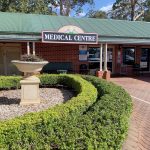WHAT IS THE PROSTATE?
Only men have a prostate. It is a small gland that sits below the bladder near the rectum. It surrounds the urethra, the passage in the penis through which urine and semen pass.
The prostate gland is part of the male reproductive system. It produces most of the fluid that makes up semen that enriches sperm. The prostate needs the male hormone testosterone to grow and develop.
The prostate is often described as being the size of a walnut and it is normal for it to grow as men age. Sometimes this can cause problems, such as difficulty urinating. These problems are common in older men and not always symptoms or signs of cancer.
WHAT ARE THE SYMPTOMS?
In the early stages, there may be no symptoms. In the later stages, some symptoms of prostate cancer might include:
- Feeling the frequent or sudden need to urinate
- Finding it difficult to urinate (for example, trouble starting or not being able to urinate when the feeling is there or poor urine flow)
- Discomfort when urinating
- Finding blood in urine or semen
- Pain in the lower back, upper thighs or hips.
These symptoms may not mean you have prostate cancer, but if you experience any of them, go and see your doctor.
WHAT ARE THE RISK FACTORS?
Factors that are most strongly linked to an increased chance of developing prostate cancer:
- Age: Prostate cancer is an age-dependent disease, which means the chance of developing it increases with age. The risk of getting prostate cancer by the age of 75 is 1 in 7 men. By the age of 85, this increases to 1 in 5.
- Family history: If you have a first degree male relative with prostate cancer, you have a higher chance of developing it than men with no such history. The risk increases again if more than one male relative has prostate cancer. Risks are also higher for men whose male relatives were diagnosed when young.
OTHER FACTORS THAT MAY INCREASE THE RISK OF DEVELOPING PROSTATE CANCER:
Factors that are most strongly linked to an increased chance of developing prostate cancer:
- Genetics: Genes are found in every cell of the body. They control the way the cells in the body grow and behave. Every person has a set of many thousands of genes inherited from both parents. Changes to genes can increase the risk of prostate cancer being passed from parent to child. Although prostate cancer can’t be inherited, a man can inherit genes that can increase the risk.
- Diet: There is some evidence to suggest that eating a lot of processed meat or food that is high in fat can increase the risk of developing prostate cancer.
- Lifestyle: There is evidence to show that environment and lifestyle can affect the risk of developing prostate cancer.
HOW IS PROSTATE CANCER DETECTED AND DIAGNOSED?
A doctor will usually do a blood test and/or physical examination to check the health of the prostate.
- Blood test (Prostate Specific Antigen (PSA) test): The result shows whether there is an increase in this specific protein. Depending on the result, you might need further investigation by a specialist. A high PSA test result does not necessarily mean cancer. Prostate diseases other than cancer can also cause a higher than normal PSA level.
- Digital Rectal Examination (DRE): Because of where the prostate is located, the doctor inserts a gloved, lubricated finger into the rectum to check the size of the prostate and assess if there are any abnormalities. A normal DRE result does not rule out prostate cancer.
DIAGNOSIS
If your tests show you may be at risk of prostate cancer, the next step is a biopsy. A biopsy is the only way a firm diagnosis of prostate cancer can be made. A urologist removes small samples of tissue from your prostate, using very thin, hollow needles guided by an ultrasound. The prostate is either accessed through the rectum (transrectal) or the perineum (transperineal), which is the area between the anus and the scrotum. A biopsy is usually done as an out-patient procedure and the doctor will likely advise a course of antibiotics afterwards to reduce the chance of infection. The tissue is sent to a pathologist to identify whether the cells are malignant (cancerous) or benign (not cancerous).
REDUCING THE RISK OF DEVELOPING PROSTATE CANCER
There is no evidence that the following protective factors can stop prostate cancer from developing, but they can improve your overall health and possibly reduce the risk of prostate cancer:
- Diet: Eat meals that are nutritious. Refer to the Australian Guide to Healthy Eating. What is good for the heart is good for the prostate.
- Physical activity/exercise: There is some evidence to show that physical activity and regular exercise can be protective factors for cancer. Try to exercise at least 30 minutes of a day.

Nutrition
Enjoy a wide variety of foods from the five food groups everyday. Healthy eating is easy! For more information visit: www.eatforhealth.gov.au



